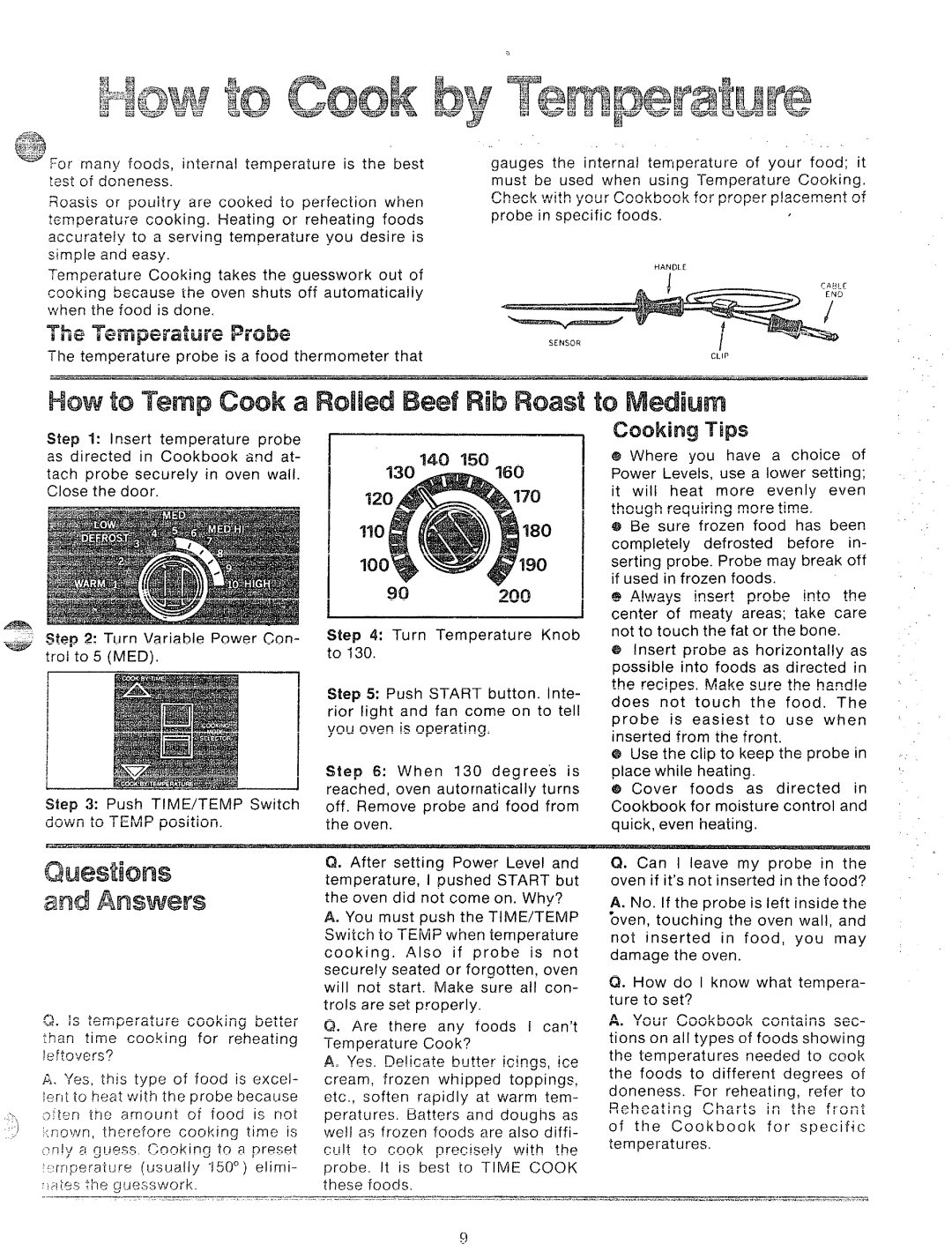
‘= For many foods, internal temperature is the best
~~~tof doneness.
Roasts or poultry are cooked to perfection when temperature cooking. Heating or reheating foods
accurately to a serving temperature you desire is simple and easy.
Temperature Cooking takes the guesswork out of
~OO~j~g~~~a~~~~heovenshuts off automatically
‘=%/henthe food is done.
gauges the internal temperature of your food; it must be used when using Temperature Cooking. Check with your Cookbook for proper placement of
probe in specific foods. | 6 |
HANDLE
CAHI.[
“The!F%Qbe
SENSOR
The temperature probe is a food thermometer that
Step 1: Insert temperature probe as directed in Cookbook and at- tach probe securely in oven wall. Close the door.
CLIP
Tips
@ Where you have a choice of |
Power Levels, use a lower setting; |
it will heat more evenly even |
though requiring more time. |
@ Be sure frozen food has been |
completely defrosted before in- |
serting probe. Probe may break off |
if used in frozen foods. |
=: Step 2: Turn Variable Power Con- trol to 5 (MED).
Step 3: Push TIM E/TEMP Switch down to TEMP position.
Q. IS temperature cooking better ;nan time cooking for reheating /eftove rs?
A. Yes, this type of food is excel- lent to heat with the probe because often the amount of food is not !.now n, therefo re cooking time is c nIy a.gUess. ~~~king to a preset
90Xx3
Step 4: Turn Temperature Knob to 130.
Step 5: Push START button. inte- rior light and fan come on to tell you oven is operating.
Step 6: When 130 degrees is reached, oven automatically turns off. Remove probe and food from
the oven.
Q. After setting Power Level and temperature, I pushed START but the oven did not come on. Why?
A. You must push the TIM WTEMP Switch to TEMP when temperature cooking. Also if probe is not securely seated or forgotten, oven will not start, Make sure all con- trols are set properly.
Q. Are there any foods I can’t Temperature Cook?
A. Yes. Delicate butter icings, ice cream, frozen whipped toppings, etc., soften rapidly at warm tem-
peratures. Batters and doughs as WelI as frozen fc)(]ds are also diffi.
cult to cook precisely with the probe. It is best to TIME COOK these foods.
@ Always insert probe into the |
center of meaty areas; take care |
not to touch the fat or the bone. |
@ !nsert probe as horizontally as |
possible into foods as directed in |
the recipes. Make sure the handle |
does not touch the food. The |
probe is easiest to use when |
inserted from the front. |
@ Use the clip to keep the probe in |
place while heating. |
a Cover foods as directed in |
Cookbook for moisture control and |
quick, even heating. |
o
Q. Can I leave my probe in the oven if it’s not inserted in the food?
A. No. If the probe is left inside the ~ven, touching the oven wall, and not inserted in food, you may damage the oven.
Q.
A.Your Cookbook contains sec- tions on all types of foods showing the temperatures needed to cook the foods to different degrees of doneness. For reheating, refer to Reheating Charts in the front of t he Cookbook for spec if{ c ternperat ures.
